
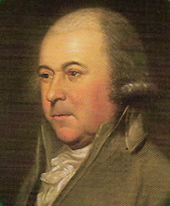 “It should be your care, therefore, and mine, to elevate the minds of our children and exalt their courage; to accelerate and animate their industry and activity; to excite in them an habitual contempt of meanness, abhorrence of injustice and inhumanity, and an ambition to excel in every capacity, faculty, and virtue. If we suffer their minds to grovel and creep in infancy, they will grovel all their lives.”
“It should be your care, therefore, and mine, to elevate the minds of our children and exalt their courage; to accelerate and animate their industry and activity; to excite in them an habitual contempt of meanness, abhorrence of injustice and inhumanity, and an ambition to excel in every capacity, faculty, and virtue. If we suffer their minds to grovel and creep in infancy, they will grovel all their lives.”
—John Adams, Dissertation on the Canon and Feudal Law, 1756
But the Day is past. The Second Day of July 1776, will be the most memorable Epocha, in the History of America. I am apt to believe that it will be celebrated, by succeeding Generations, as the great anniversary Festival. It ought to be commemorated, as the Day of Deliverance by solemn Acts of Devotion to God Almighty. It ought to be solemnized with Pomp and Parade, with Shews, Games, Sports, Guns, Bells, Bonfires and Illuminations from one End of this Continent to the other from this Time forward forever more.
—John Adams, Letter to Abigail, July 3, 1776
“I must study politics and war that my sons may have liberty to study mathematics and philosophy. My sons ought to study mathematics and philosophy, geography, natural history, naval architecture, navigation, commerce, and agriculture, in order to give their children a right to study painting, poetry, music, architecture, statuary, tapestry, and porcelain.”
—John Adams, Letter to Abigail, 1780
Introduction and Overview
When we think of the American Revolution, the first thing that comes to mind is probably the Revolutionary War. Yet in a letter to Thomas Jefferson on 24 August 1815 John Adams wrote, “What do we mean by the revolution? The war? That was no part of the revolution. It was only an effect and consequence of it. The revolution was in the minds of the people. And this was effective from 1760 to 1775 in the course of 15 years before a drop of blood was shed at Lexington.” If the Revolution was not about the war, then what was it about? When did it begin, and when did it end?
Many American historians begin the Revolutionary Era with the year 1763. The Treaty of Paris of that year ended the Seven Years, or French and Indian War, and Great Britain stood “astride the globe like a colossus.” Her North American territory secure, Great Britain turned her attention to her colonies as a means of securing the frontiers and easing the huge debt that resulted from decades of war. The tensions between the colonists and the mother country, which had always been present to a lesser degree, began to sharpen, and 12 years later the war broke out.
Why, then, the year did Adams cite 1760? His choice probably related to his mentor in law, James Otis. When the British passed a strict navigation act that allowed officials to conduct general searches of homes and warehouses without a warrant, Otis argued the case in court in 1761. He included in his argument these words: “A man's house is his castle; and while he is quiet, he is as well guarded as a prince in his castle … The act would totally annihilate this privilege.” It was a statement of a fundamental natural right of the kind Jefferson would include in his Declaration of Independence.
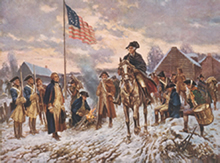 The end date of the Revolution is not so easy to assign. The year 1783, which brought the Treaty of Paris and official recognition of American independence is certainly one possible date. But the Articles of Confederation did not create a unified state, but a confederation under which each state retained its sovereignty. Many historians therefore extend the date to 1789, the year in which the Constitution went into effect. There is a logic in that, for it is clear that the colonies-become-states could not have survived and prospered under the Articles, so it is fair to argue that without the unifying effect of the Constitution, the Revolution would not have been complete.
The end date of the Revolution is not so easy to assign. The year 1783, which brought the Treaty of Paris and official recognition of American independence is certainly one possible date. But the Articles of Confederation did not create a unified state, but a confederation under which each state retained its sovereignty. Many historians therefore extend the date to 1789, the year in which the Constitution went into effect. There is a logic in that, for it is clear that the colonies-become-states could not have survived and prospered under the Articles, so it is fair to argue that without the unifying effect of the Constitution, the Revolution would not have been complete.
Despite the contentious nature of our modern elections, we take it for granted that power will regularly change hands without bloody rioting. But in the 1790s that was no certainty, for the country was in perhaps the most agitated political state in which it had ever found itself, with the exception of the Civil War years. At least one noted historian has argued that had the Republicans not won the election of 1800, the country might well have broken up or resorted to violence. Although we associate secession with the Civil War era, it was openly discussed even at that time, as the different areas of the country found themselves unable to agree on the proper course of the American nation under a Constitution which had, in some respects, been left deliberately vague even as it strengthened the federal government at the expense of the states.
The 1790s do, then, belong to the formative years of the Revolution, for even after the Constitution was adopted, a certain time was required for the meaning of it all to begin to settle in. For good reasons strong disagreement as to what was the true meaning of the Revolution—and even of the Constitution—existed for some time. (As we will discuss later, the ratification of the Constitution necessary for its adoption came perilously close to not succeeding.) Thus, we will set 1800 as the end date for the revolutionary era. In a real sense, however, the American Revolution has never ended, for as we debate our political differences and argue over laws, courts, politicians, and administrators, we continue to define the meaning of the American Revolution and American democracy.
In 1800 when a Republican president and a Republican Congress replaced the Federalists, who had been in power for 12 years under presidents Washington and Adams, the government changed hands without incident. Thomas Jefferson recognized the significance of 1800 when he called the election of that year a “revolution”; for the first time in the modern world, political power at the top of a nation had changed hands without the shedding of blood. There is good reason to endorse Jefferson's claim and to say that once the democratic process had demonstrated that there could be an orderly transfer of power in United States, then the true goal of the revolution had been achieved.
Buildup to Revolution
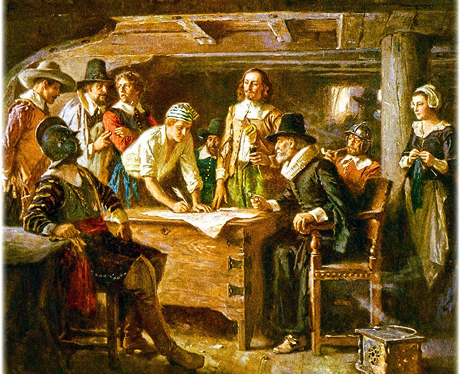 The previous chapters of American history take us through 1763, when the colonies were developed to the extent that they had the capacity to become a separate nation. It has been said that contact with the frontier environment changes people and the way they think, and there is much evidence to support that claim for American history well into the 19th century. Practices that were accepted as normal in the home country did not necessarily work in America, and skills that were undervalued in Europe offered a path to self-sufficiency for many American colonists. Life in the fields and forests of America was very different from life in the streets and alleys of Hamburg or London, as well as in the British countryside. From the time of the Mayflower Compact, American began to realize the eesential value of self-government. The signers of the document wrote
“We ... covenant and combine ourselves together into a civil Body Politick, for our
better Ordering and Preservation ... ; And
by Virtue hereof do enact, constitute, and frame, such just and equal Laws,
Ordinances, Acts, Constitutions, and Offices, from time to time, as shall be
thought most meet and convenient for the general Good of the Colony; unto which
we promise all due Submission and Obedience.”
The previous chapters of American history take us through 1763, when the colonies were developed to the extent that they had the capacity to become a separate nation. It has been said that contact with the frontier environment changes people and the way they think, and there is much evidence to support that claim for American history well into the 19th century. Practices that were accepted as normal in the home country did not necessarily work in America, and skills that were undervalued in Europe offered a path to self-sufficiency for many American colonists. Life in the fields and forests of America was very different from life in the streets and alleys of Hamburg or London, as well as in the British countryside. From the time of the Mayflower Compact, American began to realize the eesential value of self-government. The signers of the document wrote
“We ... covenant and combine ourselves together into a civil Body Politick, for our
better Ordering and Preservation ... ; And
by Virtue hereof do enact, constitute, and frame, such just and equal Laws,
Ordinances, Acts, Constitutions, and Offices, from time to time, as shall be
thought most meet and convenient for the general Good of the Colony; unto which
we promise all due Submission and Obedience.”
We have also noted a difference between the people who came to America, at least those who came voluntarily, and the people who did not. It took a certain character to leave one's hearth and home and family and travel across the ocean on a dangerous voyage into an uncertain future, where life might in time be better, but was sure to be hard, at least at first. The conditions that confronted the colonists when they arrived, especially in the early decades, must have caused them to rethink the way they intended to live their lives.
It is also ironic that the Americans who rebelled were in many ways the freest people in the civilized world in 1760. Until then the hand of government had touched them but lightly; even where British laws sought to control their lives, as with the early navigation acts, Americans found it easy to work their way around the legal restrictions imposed by the Crown. The colonists had gotten used to doing things their own way. When the British attempted to change that by bringing them under the heavy hand of a distant government, the Americans resisted. In that sense, the American Revolution was not only about change, but about preserving a way of life to which the hardy colonists had grown accustomed.
Another aspect of the Revolution is that Americans had a strong sense of their rights. As we discussed in the section on The Enlightenment, modes of thinking changed significantly during the Age of Reason. Scientific discoveries by man like Francis Bacon and Sir Isaac Newton had begun to explain the physical world in far more accurate terms than were possible until that time. A book on literacy published in 1815 suggested that Americans were perhaps the most literate people in the world, and it was not just the wealthy and prosperous who could read. Newspapers proliferated in the colonies, and primary schools had been established in many communities; it was estimated that up to ninety percent of American males were literate. Thus, the ideas of philosophers like John Locke, David Hume, Montesquieu, and others were well known in America. As Jefferson said about the Great Declaration, he tried to make it an “expression of the American mind.”
In other words, Americans had a strong sense of the natural rights to which they were entitled. They understood the meaning of Jefferson's declaration, that all men are created equal and have the right to life liberty and the pursuit of happiness. They saw the actions of the Crown as an encroachment on their liberty, to which they were entitled as human beings. That is why John Adams said that the revolution began in the minds of the people; they knew they thinking had no right to curtail their freedoms.
The end of the French and Indian, or Seven Years War, in 1763 opened the door for revolutionary change. The French had been driven out of North America, and Great Britain stood “astride the world like a colossus.” Although Great Britain was still a very wealthy nation, the government was deeply in debt. The American 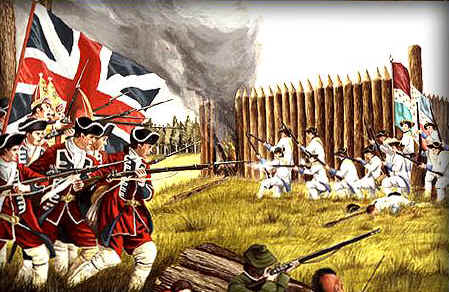 population had grown enough for Parliament to notice. British officers who had fought in America during the war carried reports of American prosperity when they returned home. The French and Indian war and his predecessors had been expensive, and Great Britain was deeply in debt. There were bills to be paid, and the British government decided it was time for the colonies to pay their share.
The colonists didn't necessarily see it that way. Americans had fought in the war, some of them had died, and they had their own bills to pay. They were aware of their fundamental political rights and were in no mood to be trampled underfoot by an overweening British Crown. They were still loyal subjects but had been governing themselves successfully for decades. When Parliament began to impose new restrictions on the colonies, the first seeds of resistance were planted. Nevertheless, at that time few if any Americans were thinking about a formal separation. Independence from Great Britain would come later.
population had grown enough for Parliament to notice. British officers who had fought in America during the war carried reports of American prosperity when they returned home. The French and Indian war and his predecessors had been expensive, and Great Britain was deeply in debt. There were bills to be paid, and the British government decided it was time for the colonies to pay their share.
The colonists didn't necessarily see it that way. Americans had fought in the war, some of them had died, and they had their own bills to pay. They were aware of their fundamental political rights and were in no mood to be trampled underfoot by an overweening British Crown. They were still loyal subjects but had been governing themselves successfully for decades. When Parliament began to impose new restrictions on the colonies, the first seeds of resistance were planted. Nevertheless, at that time few if any Americans were thinking about a formal separation. Independence from Great Britain would come later.
The Enlightenment, which we have already discussed, generated new ways of thinking about how the world functioned and how it could function better. Republicanism, a representative form of democracy, although not yet highly developed, was gaining currency in Europe. The ruling classes who felt that monarchy was the ideal form of government considered republicanism a highly radical concept. Republicans were seen as wild-eyed fanatics who favored mob rule if not outright anarchy. Because of the nature of life in colonial America, where birthright and inherited benefits carried little weight, liberal ideas such as republicanism found in America much more fertile ground in which to develop.
Americans were also well versed in political philosophy from reading John Locke and others. American ideology also heavily emphasized the idea of “virtue” as a necessary component of political structure—another idea from the Enlightenment.
As Great Britain began to tighten the screws on the colonists after 1763, the colonists struggled to maintain the status quo which had existed since before the French and Indian War. Americans assumed that their colonial legislatures were the equivalents of Parliament. They believed that since they were not represented in Parliament, only their own colonial assemblies could tax them. Americans knew and believed in the British Constitution, though they saw it somewhat differently from many British. In conclusion, although there was no conscious thought of independence in America in 1763, Americans quickly began to see that in many ways they were drifting farther apart from their British cousins.
Many theories of revolution exist, but they do not always explain what happened in America. For example, one assumed necessary ingredient of revolution is widespread discontent, yet the average American was in general as well off as anyone in the world at that time. There were fewer very rich people, but far less poverty. Yet revolutions generally start with discontent, though it is not always clear to what extent wrongs are real or perceived. The discontent in America grew when Parliament began to impose its will upon the daily lives of the American people through taxes and stricter laws.
Some of the American discontent with Parliament was probably misconstrued. Although the effects of British policy touched Americans, its actions may not have been intended that way. The British government was in debt, they needed to raise money, and the Americans were a likely source of income through taxation. In the end, however it probably does not matter whether the discontent was real or imagined. It is interesting to note that four major revolutions (the English, American, French & Russian) all began with government trying to get more money out of the people.
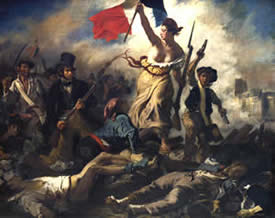 |
In order for a great conflagration to be ignited in human society, it is usually necessary that each party to the dispute make miscalculations concerning the intent and the courage of its adversary sufficiently profound to allow it to proceed on a course that will inevitably bring disaster. —Page Smith, A New Age Now Begins (New York: McGraw-Hill, 1976) vol I, p. 428. The foundation of our Empire was not laid in the gloomy age of Ignorance and Suspicion, but at an epic when the rights of mankind were better understood and more clearly defined, then at any former period. —George Washington |
Eugène Delacroix, 1830 |
 |
The Historic Significance of the Revolution
The ideals of the revolution have been carried forward in the two and a half centuries since those events occurred. If we study the revolution carefully, we can learn much more about ourselves as a nation. They also shed light on subsequent events, such as the American Civil War when both sides felt they were fighting to preserve the legacy of the struggle for independence. In many ways an understanding of the American Revolution can also shed light on the American experience in Vietnam.
The American Revolution stretched far beyond our shores—it was an event that touched the world. The French Revolution that began while the American Revolution was still being affirmed involved some of the same players, but the character and results of the two revolutions were very different.
We sometimes think of revolutionaries as wild-eyed radicals, but in fact the American revolutionary leaders were almost boring in their lack of revolutionary passion. They didn’t throw firebombs in the streets or make frenzied speeches on street corners. They debated in churches, courthouses and legislative chambers soberly and with restraint, occasionally rising to passionate oratory. Washington, Jefferson, Adams and Franklin were among the least radical Americans, yet they were all technically guilty of treason.
Although we tend to believe that the revolution was led from the top by those distinguished gentlemen and their colleagues who served in the state legislators and the congresses that were formed as the nation united, in fact the revolution proceeded in many ways from the bottom up. The people knew when they were being oppressed; they didn’t have to be told. They formed committees of correspondence and communicated with each other, spreading the word about what they saw as grievances piled upon them by a heavy-handed Parliament. They could be moved by the power of revolutionary rhetoric, but they were also moved by soberly thoughtful documents such as Thomas Paine’s Common Sense.
That said, it is true that the American leaders were the American aristocracy, men of “striking respectability and social standing.” Members of the Continental Congress that signed the declaration of independence and later the Constitution, for example, were educated men: they were lawyers, doctors, merchants, ministers and ministers’ sons. When it came to the crucial decisions to be made, they provided the leadership. As resistance grew, there were moderates and extremists among them, but most eventually embraced independence.
One important question is whether the revolution changed anything substantial. In most cases revolutions overthrow a system that exists and create new structures of both society and government. That did not happen in the American Revolution; true there was a transfer of property during the revolution as loyalist establishments were attacked by the rebels. But the political leaders who lead the revolution remained in leadership positions when it was over, and the institutions that the colonists, now citizens of the states, had come to appreciate remained intact. It is true that new ideas took hold and grew and were modified in subsequent decades, but the fundamental concepts adopted by the Americans during the Revolutionary era remain in place for decades.
| Sage American History Home | American Revolution Home | | Updated May 19, 2020 |